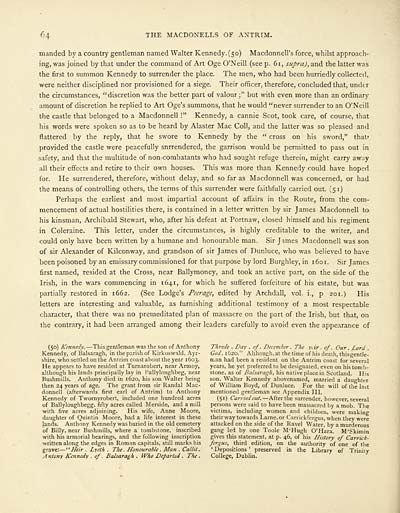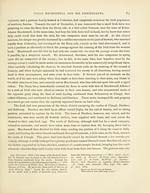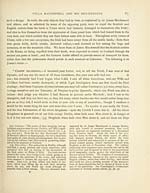Historical account of the Macdonnells of Antrim
(78) Page 64
Download files
Complete book:
Individual page:
Thumbnail gallery: Grid view | List view

64 THE MACDONELLS OF ANTRIM.
manded by a country gentleman named Walter Kennedy. (50) Macdonnell's force, whilst approach-
ing, was joined by that under the command of Art Oge O'Neill (see p. 61, supra), and the latter was
the first to summon Kennedy to surrender the place. The men, who had been hurriedly collected,
were neither disciplined nor provisioned for a siege. Their officer, therefore, concluded that, undtr
the circumstances, "discretion was the better part of valour;" but with even more than an ordinary
amount of discretion he replied to Art Oge's summons, that he would "never surrender to an O'Neill
the castle that belonged to a Macdonnell !" Kennedy, a cannie Scot, took care, of course, that
his words were spoken so as to be heard by Alaster Mac Coll, and the latter was so pleased and
flattered by the reply, that he swore to Kennedy by the " cross on his sword," that'
provided the castle were peacefully snrrendered, the garrison would be permitted to pass out in
safety, and that the multitude of non-combatants who had sought refuge therein, might carry away
all their effects and retire to their own houses. This was more than Kennedy could have hoped
for. He surrendered, therefore, without delay, and so far as Macdonnell was concerned, or had
the means of controlling others, the terms of this surrender were faithfully carried out. (51)
Perhaps the earliest and most impartial account of affairs in the Route, from the com-
mencement of actual hostilities there, is contained in a letter written by sir James Macdonnell to
his kinsman, Archibald Stewart, who, after his defeat at Portnaw, closed himself and his regiment
in Coleraine. This letter, under the circumstances, is highly creditable to the writer, and
could only have been written by a humane and honourable man. Sir James Macdonnell was son
of sir Alexander of Kilconway, and grandson of sir James of Dunluce, who was believed to have
been poisoned by an emissary commissioned for that purpose by lord Burghley, in 1601. Sir James
first named, resided at the Cross, near Ballymoney, and took an active part, on the side of the
Irish, in the wars commencing in 1641, for which he suffered forfeiture of his estate, but was
partially restored in 1662. (See Lodge's Peerage, edited by Archdall, vol. i., p 201.) His
letters are interesting and valuable, as furnishing additional testimony of a most respectable
character, that there was no premeditated plan of massacre on the part of the Irish, but that, on
the contrary, it had been arranged among their leaders carefully to avoid even the appearance of
(50) Kennedy. — This gentleman was the son of Anthony Threde . Day . of . December . The ycir.of. Our . Lord .
Kennedy, of Balsaragh, in the parish of Kirkoswald, Ayr- God. 1620." Although, at the time of his death, thisgentle-
shire, who settled on the Antrim coast about the year 1603. n.an had been a resident on the Antrim coast for several
He appears to have resided at Turnarobert, near Armoy, years, he yet preferred to be designated, even on his tomb-
although his lands principally lay in Pallyloughbeg, near stone, as of Balsaragh, his native place in Scotland. His
Bushmills. Anthony died in 1620, his son Walter being son, Walter Kennedy abovenamed, married a daughter
then 24 years of age. The grant from sir Randal Mac- of William Boyd, of Dunluce. For the will of the last
donnell (afterwards first earl of Antrim) to Anthony mentioned gentleman see Appendix III.
Kennedy of Twornyrobert, included one hundred acres (51) Carried out. — After the surrender, however, several
of Ballyloughbegg, fifty acres called Merside, and a mill persons were said to have been massacred by a mob. The
with five acres adjoining. His wife, Anne Moore, victims, including women and children, were making
daughter of Quintin Moore, had a life interest in these theirway towards Larne, or Carrickfergus, when they were
lands. Anthony Kennedy was buried in the old cemetery attacked on the side of the Ravel Water, by a murderous
of Billy, near Bushmills, where a tombstone, inscribed gang led by one Toole M'Hugh O'Hara. M'Skimin
with his armorial bearings, and the following inscription gives this statement, at p. 46, of his History of Carrkk-
written along the edges in Roman capitals, still marks his fergus, third edition, on the authority of one of the
grave: — "Heir. Lyeth . The . Honourable . Man . CaliU . 'Depositions' preserved in the Library of Trinity
Antony Kennedy . of . Balsaragh . Who Departed . The. College, Dublin.
manded by a country gentleman named Walter Kennedy. (50) Macdonnell's force, whilst approach-
ing, was joined by that under the command of Art Oge O'Neill (see p. 61, supra), and the latter was
the first to summon Kennedy to surrender the place. The men, who had been hurriedly collected,
were neither disciplined nor provisioned for a siege. Their officer, therefore, concluded that, undtr
the circumstances, "discretion was the better part of valour;" but with even more than an ordinary
amount of discretion he replied to Art Oge's summons, that he would "never surrender to an O'Neill
the castle that belonged to a Macdonnell !" Kennedy, a cannie Scot, took care, of course, that
his words were spoken so as to be heard by Alaster Mac Coll, and the latter was so pleased and
flattered by the reply, that he swore to Kennedy by the " cross on his sword," that'
provided the castle were peacefully snrrendered, the garrison would be permitted to pass out in
safety, and that the multitude of non-combatants who had sought refuge therein, might carry away
all their effects and retire to their own houses. This was more than Kennedy could have hoped
for. He surrendered, therefore, without delay, and so far as Macdonnell was concerned, or had
the means of controlling others, the terms of this surrender were faithfully carried out. (51)
Perhaps the earliest and most impartial account of affairs in the Route, from the com-
mencement of actual hostilities there, is contained in a letter written by sir James Macdonnell to
his kinsman, Archibald Stewart, who, after his defeat at Portnaw, closed himself and his regiment
in Coleraine. This letter, under the circumstances, is highly creditable to the writer, and
could only have been written by a humane and honourable man. Sir James Macdonnell was son
of sir Alexander of Kilconway, and grandson of sir James of Dunluce, who was believed to have
been poisoned by an emissary commissioned for that purpose by lord Burghley, in 1601. Sir James
first named, resided at the Cross, near Ballymoney, and took an active part, on the side of the
Irish, in the wars commencing in 1641, for which he suffered forfeiture of his estate, but was
partially restored in 1662. (See Lodge's Peerage, edited by Archdall, vol. i., p 201.) His
letters are interesting and valuable, as furnishing additional testimony of a most respectable
character, that there was no premeditated plan of massacre on the part of the Irish, but that, on
the contrary, it had been arranged among their leaders carefully to avoid even the appearance of
(50) Kennedy. — This gentleman was the son of Anthony Threde . Day . of . December . The ycir.of. Our . Lord .
Kennedy, of Balsaragh, in the parish of Kirkoswald, Ayr- God. 1620." Although, at the time of his death, thisgentle-
shire, who settled on the Antrim coast about the year 1603. n.an had been a resident on the Antrim coast for several
He appears to have resided at Turnarobert, near Armoy, years, he yet preferred to be designated, even on his tomb-
although his lands principally lay in Pallyloughbeg, near stone, as of Balsaragh, his native place in Scotland. His
Bushmills. Anthony died in 1620, his son Walter being son, Walter Kennedy abovenamed, married a daughter
then 24 years of age. The grant from sir Randal Mac- of William Boyd, of Dunluce. For the will of the last
donnell (afterwards first earl of Antrim) to Anthony mentioned gentleman see Appendix III.
Kennedy of Twornyrobert, included one hundred acres (51) Carried out. — After the surrender, however, several
of Ballyloughbegg, fifty acres called Merside, and a mill persons were said to have been massacred by a mob. The
with five acres adjoining. His wife, Anne Moore, victims, including women and children, were making
daughter of Quintin Moore, had a life interest in these theirway towards Larne, or Carrickfergus, when they were
lands. Anthony Kennedy was buried in the old cemetery attacked on the side of the Ravel Water, by a murderous
of Billy, near Bushmills, where a tombstone, inscribed gang led by one Toole M'Hugh O'Hara. M'Skimin
with his armorial bearings, and the following inscription gives this statement, at p. 46, of his History of Carrkk-
written along the edges in Roman capitals, still marks his fergus, third edition, on the authority of one of the
grave: — "Heir. Lyeth . The . Honourable . Man . CaliU . 'Depositions' preserved in the Library of Trinity
Antony Kennedy . of . Balsaragh . Who Departed . The. College, Dublin.
Set display mode to:
![]() Universal Viewer |
Universal Viewer | ![]() Mirador |
Large image | Transcription
Mirador |
Large image | Transcription
Images and transcriptions on this page, including medium image downloads, may be used under the Creative Commons Attribution 4.0 International Licence unless otherwise stated. ![]()
| Histories of Scottish families > Historical account of the Macdonnells of Antrim > (78) Page 64 |
|---|
| Permanent URL | https://digital.nls.uk/95342183 |
|---|
| Description | A selection of almost 400 printed items relating to the history of Scottish families, mostly dating from the 19th and early 20th centuries. Includes memoirs, genealogies and clan histories, with a few produced by emigrant families. The earliest family history goes back to AD 916. |
|---|

